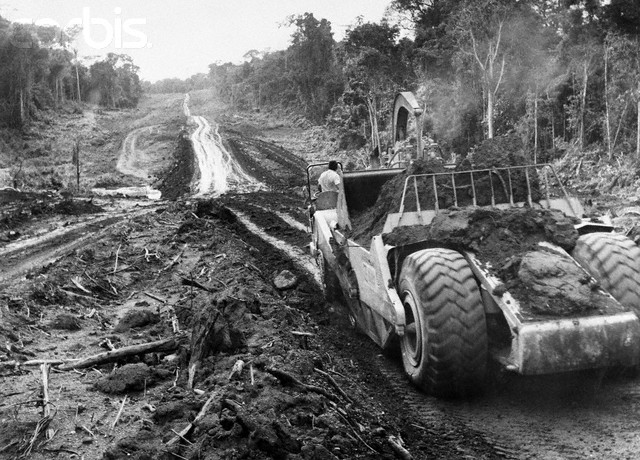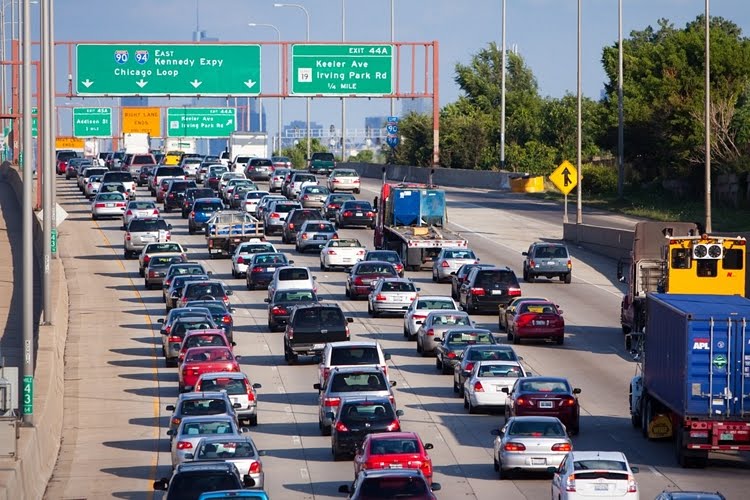Amazon Books: The Parable of the Trans Amazon Highway
May 24, 2014
Most people don’t know that I lived in Brazil in the period before the sheep’s foot rollers crunched through the Brazilian rain forest. The environmental adjustment was due to the need to prepare for the massive Trans Amazon Highway. When the project began to take shape, preparations had to be made. Once Rodovia Transamazonia became “official”, decades of political and economic preparation had been underway. By the mid 1950s, the need for BR 153 was evident to anyone who tried to go west from any major Brazilian city. It was an airplane or weeks, maybe months, of multi-modal transportation. Need to get across a stream. Chop down trees and put up a “bridge.”

Pretty darned effective I learned first hand. Source: http://bit.ly/1r3uFMY
I recall riding in a Caterpillar bulldozer equipped with two sets of sheep foot rollers. Push though the jungle and then drag the rollers over the trees, slow moving animals, and the occasional native’s house, and you are ready to get down to road building. My father, never the environmentally sensitive type, explained that heavy equipment and bulldozing were beautiful: fast, cheap, effective, and potent. And even I, as a child, understood that the natives had to find their future elsewhere. Once the heavy equipment rolled through, the old ways were toast.
I fondly recalled these early lessons from my father, the giant US company for whom he labored as Managing Director, and stunned look on the faces of the people who lived in the forest and scrubland as we rolled through. In my mind’s eye, I imagine the Hachette professionals have that same look: A mixture of surprise, anger, and confusion. The heavy equipment drivers just shifted gears and crushed forward.
I read “As Publishers Fight Amazon, Books Vanish.” Interesting because the company appears to be bulldozing its way through traditional book publishing. My thought is that when the bulldozers finish, the old way is either gone or too expensive to continue. Savvy natives packed up and moved to favelas and reinvented themselves. Some were entrepreneurs and others tried to recapture a life in a transformed environment.
Digital bulldozers transform business process landscapes with speed and brutal efficiency. My father would have been proud of this approach to business. His one regret would be that Amazon’s corporate colors were not the flashy yellow and black that he so loved.
There were a couple of points in the “real” journalism article I noted. Let me highlight each and make a short comment.
First, “The literary community is fearful and outraged, and practically begging for government intervention.” My thought, “Once the forest has been bulldozed, it is tough to regrow.”
Second, “But the real prize is control of e-books, the future of publishing.” My thought, isn’t the future clear. Hasn’t Amazon won? If it had not won, why then the surprise that the bulldozer crushed traditional business processes the way the bulldozer took out the natives’ houses?
Third, the statement “If this is the new American way [attributed to writer and former advertising professional James Patterson], then maybe it has to be changed—by law, if necessary—immediately, if not sooner.” Catchy statement, but I thought, isn’t it too late? Regrowing that jungle and moving the natives back is a somewhat tough task.
Fourth, Amazon allegedly has been making it tough to buy a biography critical of former Wall Street quant Jeff Bezos. My father did not give interviews either. Guess what? The highway was built through the gut of the Amazon.
And the parable?
Once the landscape is changed, going back gets tough. Modern life is not congruent to Rousseau’s fantasy.

Parts of the Transamazonian experience looks like Paramus, New Jersey. Image source: http://bit.ly/1kdwdPz
Amazon, like Google, has been operating for many years, pursuing the same goals, using the mechanisms of online, and building support from people who spend money.
Maybe governments are more powerful than Amazon, Google, and Facebook? The reality, however, is that the bulldozers have already rolled through. The dispossessed, annoyed, and confused can talk. It is going to be very difficult to restore the jungle and the previous way of life.
By the way, search doesn’t work too well on Amazon to begin with. Not being able to find a book is par for Amazon’s course. Bad search helps sales and Amazon’s imperative. I have learned to live with it. Perhaps the publishers, authors, and real journalists should follow my example. Adapt and move on. Yelling at a bulldozer driver and throwing rocks doesn’t change reality.
Stephen E Arnold, May 23, 2014
Comments
One Response to “Amazon Books: The Parable of the Trans Amazon Highway”



D D Photographics
Amazon Books: The Parable of the Trans Amazon Highway : Stephen E. Arnold @ Beyond Search